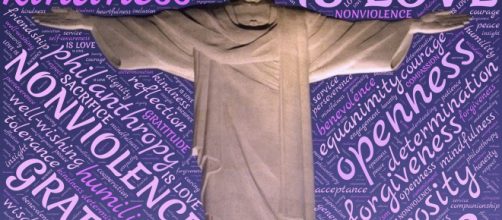Nonviolence is a minority tactic. Or is it? I will argue that it is a majority means of enforcing restraint. The restraint is necessary to survival. Everyone has the power to choose evil. The only way to defeat that power is to individually reject it. Ultimately, the world survives because enough people are determined not to fight. But of course, the problem persists. Nations fight. Groups fight. Violence is still in the saddle. And it is intensified in today's world by nuclear fears.
Triadic philosophy seeks a result that looks like this. A world in which violence is taboo.
Seriously, this means the bully will find a way to channel that energy to something decent. It means that nations that believe they can shoot their way to democracy to repent of their ways. It means that we treat violence like smoking and apply the same means of messaging and mass censure to diminish it. Which raises the question, would nonviolence have been an option for Dietrich Bonhoeffer?
Bonhoeffer
When Hitler rose to power, Bonhoeffer was a young German Christian. He came to New York as the war was about to break out. He returned to Germany. He was a serious, thoughtful, and theological mind. As the war went on, he determined that killing Hitler would be the right thing to do. He was hardly alone.
Hitler was lucky not to have fallen to at least one of the attempts made on his life. Bonhoeffer's plot failed and he was jailed and executed. His actions have remained an occasion to celebrate his commitment and courage.
But what would a nonviolent effort have looked like?
Nonviolence
I do not know. Had Bonhoeffer been inclined to oppose Hitler in a way that would have meant immediate death for him and likely no harm to Hitler, what would have been the point? On the other hand, there would have been witnesses to this sort of action. Bonhoeffer could have gone down in history as a nonviolent hero.
I just published “Bonhoeffer’s Ghost” https://t.co/6Zp6Lh1gfH
— Stephen C. Rose (@stephencrose) February 9, 2018
Jesus was a nonviolent hero.
His entire emphasis can be construed as a contrarian take on the way our world works. Instead of placing our needs first, he placed the needs of others first. Ideally, this sort of neighborliness is reciprocated. That would mean a world of peace. Jesus was the path-breaker. He started a way of life that he derived from Abba, the one to whom he prayed.
What did Jesus pray?
He prayed that the earth becomes heavenly. He prayed that bread is evenly distributed. He prayed we forgive others in exchange for our being forgiven by Abba.
Bonhoeffer had a problem and it was not his commitment to violence. He was on the fence, torn between rejecting orthodox Christianity, creeds, and churches, in favor of what he called "religionless Christianity." He never made the leap. He never had the time. He could have interpreted nonviolence as a message to live a full life beyond the borders of warlike religion.


